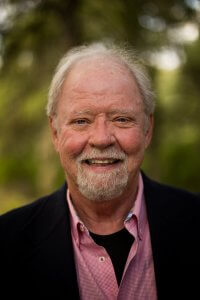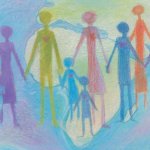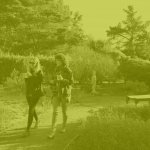
Being Certain About Uncertainty
 Uncertainty continues to grow and expand and deepen around us, creating perhaps, its own virus, a virus in the heart. We hear the words today, “everything is so fluid and we don’t know what’s next.” My own levels of anxiety continue to rise, so I returned to one of my favorite books by a beloved writer to calm myself: When Things Fall Apart: Heart Advice for Difficult Times by the Buddhist nun, Pema Chodron. In addition to her gift for bringing some fundamental ideas of Buddhism into the Western world, she explores the place of compassion and sacredness in our lives, especially when the bottom begins to shred beneath us. I share a few insights from her writings that have helped me during this time when groundlessness may be the instigator of panic, binge shopping and hoarding.
Uncertainty continues to grow and expand and deepen around us, creating perhaps, its own virus, a virus in the heart. We hear the words today, “everything is so fluid and we don’t know what’s next.” My own levels of anxiety continue to rise, so I returned to one of my favorite books by a beloved writer to calm myself: When Things Fall Apart: Heart Advice for Difficult Times by the Buddhist nun, Pema Chodron. In addition to her gift for bringing some fundamental ideas of Buddhism into the Western world, she explores the place of compassion and sacredness in our lives, especially when the bottom begins to shred beneath us. I share a few insights from her writings that have helped me during this time when groundlessness may be the instigator of panic, binge shopping and hoarding.
I must admit parenthetically that I am more than a little intrigued by the run on toilet paper nationally as a metaphor for people having a strong desire to wipe up the mess that they feel their lives gravitating towards. There is indeed a myth in the metaphor. But to return to Chodron’s calming insights that have helped me reclaim my center.
Rereading some select passages, I began to notice how her insights on impermanence seemed so applicable to many of our feelings of uncertainty and its first cousin, insecurity, as the spread of the Corona virus weaves its way into all parts of the planet. I am relearning from Chodron how a pandemic does not have to lead to pandemonium unless we choose to allow it and even encourage it by making ME the center of the pandemic while excluding all generosity towards others.
She asks us to consider another tact on our feelings of impermanence, going so far as to suggest that “Impermanence is the goodness of reality. . . . Impermanence is the essence of everything,” adding that in general, “people have no respect for impermanence;. . . in fact, we despair of it. We regard it as pain. We try to resist it by making things that will last—forever.” In doing so, she claims, we can easily “lose our sense of the sacredness of life.”
My sense is that her remarks on impermanence strike close to the heart beat of uncertainty. In fighting either one, I can feel that my reference points in my daily life can be shaken, begin to fall apart and need to be reclaimed not by force but by yielding to and becoming curious about my relation with both impermanence and uncertainty. It is also a potent opportunity to remember that today so many others are feeling the need/desire to self-quarantine, meaning paying no attention to or caring for others, for noticing what others might need from us and acting on it.
I am also curious at this stage how any of our reference points of our life can be seen as our reverence points—places in which the sacred– what we treasure and value–have their most dramatic expressions. What I reference on a daily basis is what I reverence. If I can reference others rather than solely myself, then I can show reverence towards them and recognize their own sacredness in the midst of fear.
Chodron describes at one point how these can become focal points of wisdom, even opportunities to examine life-long habits of responding to them when they appear, which, if such an attitude is not cultivated in our current condition of uncertainty of where the virus will take all of us, then when? Her approach goes even deeper: she suggests that if we can see ourselves nested within our feelings of impermanence and uncertainty from a place that is not so ego-centric, which is the genesis of both panic and fear, then things transform vividly. Here is what she understands: “Egolessness is available all the time as freshness, openness, delight in our sense perceptions. . . we also experience egolessness when we don’t know what’s happening. . . . We can notice our reactions to that.” I find this very difficult to do, but know that I/we must make the effort.
I find her observations to be curiously comforting as I try to be more relaxed with the uncertainty, even the shivering presence of panic just below the surface, that faces all of us each day around the planet: will there be enough money, food, health, health-care, cooperation, unity in the face of increasing adversity? When the same old patterns “of grasping and fixating” continue to drive us towards greater insecurity wherein the patterns are repeated with renewed gusto, we can, she notes at the end of her reflections, “relate to our circumstances with bitterness or with openness.” We cannot forget that we do have profound choices within the circle of uncertainty and panic. We can choose to remain and to increase our humanity towards one another in this moment when, not unlike 911, when we united around the courage of our shared community.
Our greatest freedom may indeed reside in how we relate to the mess we feel around and perhaps within us.
Dennis Patrick Slattery




